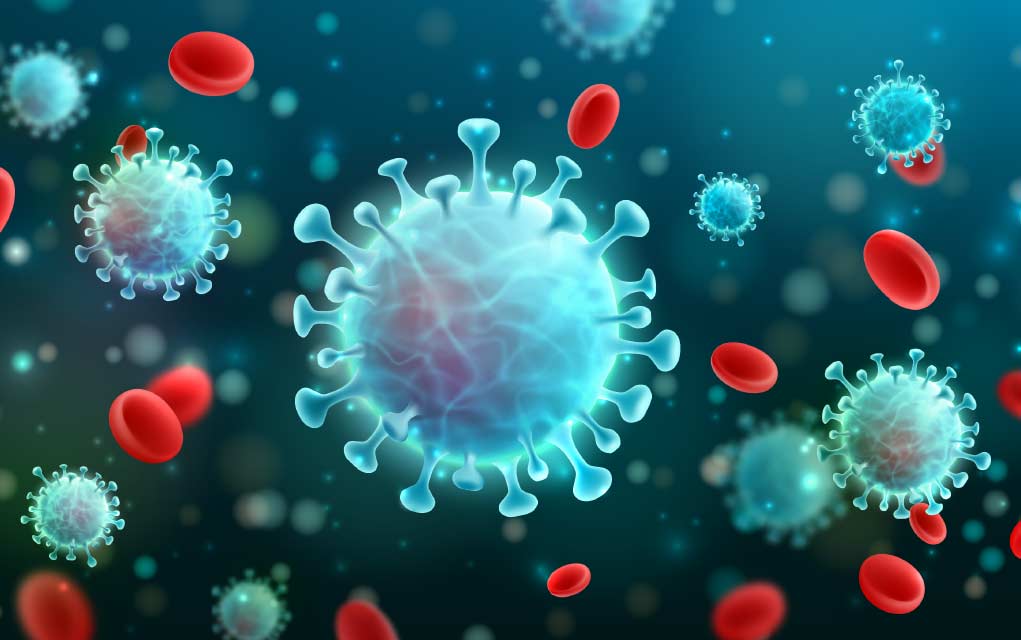Some People Remain Contagious Long After COVID-19 Symptoms

Typically, when we get sick, many of us are careful to stay away from others while we have a fever and symptoms so we don’t spread the illness. But a study has reported that it may be possible to spread the novel coronavirus even after we’ve begun to feel better and are no longer experiencing symptoms. And this could account for the difficulty of containment. How long might you be contagious after having had COVID-19?
With most viral infections, your degree of contagion drops once symptoms and fever resolve. A study has found, however, that’s not the case for those recovering from COVID-19. That study found that up to 50% of the people infected with even mild cases of COVID-19 can remain contagious for an average of 8 days after symptoms resolve, while another study found that virus shedding continued for more than 2 weeks after the development of antibodies — which would be 24-30 days after the onset of symptoms.
COVID-19 Research on Remaining Contagious After Symptoms Resolve
Researchers studied 16 patients who received treatment for mild COVID-19 symptoms at the Treatment Center of PLA General Hospital in Beijing, China. They found that 50% of the patients continued to shed the virus (which is what causes the spread of the virus), even after their symptoms had been resolved. They discovered the virus was shed for an average of 8 days post-illness, but the researchers believe contagion may last even longer for patients with severe infections.
A case study from Taipei, Taiwan, followed the case of a 50-year-old woman from Wuhan, China, who presented with a fever of 101.5 degrees Fahrenheit (38.6 degrees Celsius) but otherwise mild symptoms. After testing positive for the novel coronavirus, she continued to run low-grade fevers daily, but otherwise experienced mild symptoms for the next 9 days. However, researchers continued testing. On day 10, all symptoms seemed to have resolved and antibodies were detected in her blood, but she still tested positive for viral load — meaning she could still infect others. By day 18, nine days after the fever had stopped, viral cells could still be isolated from blood and nasal samples. In fact, even though viral cells could not be isolated after day 18, viable RNA could be found in the patient’s system through day 63 of the study.
The results from these studies call into question asymptomatic transmission not only before the onset of symptoms but after, too. Based on the reports, medical professionals might be paying closer attention to patients after treatment to ensure they are not contagious.
How to Keep From Spreading the Virus
If you’re sick, even with a mild form of the virus, and are self-quarantining, you should add a minimum of 2 weeks to your quarantine time after symptoms resolve to help ensure you do not infect others. Even then, continue to wear cloth face coverings if you are around any other people and observe rigorous hand-washing and hygiene practices.
If you have or suspect you have COVID-19, avoid being around anyone who might be at a high risk for severe or potentially deadly effects of the illness. This includes those who are older, have diabetes, heart or lung conditions, transplant recipients, or radiation and chemotherapy patients.
Ideally, anyone who has had even a mild case should continue to self-isolate for as long as possible. As an alternative, they might consult a health professional and ask for a nasal swab test to determine if they’re still shedding the virus. A doctor will advise as to whether or not tests are available. Continue to self-quarantine until ya test can come back negative
If you have a friend or a relative who has been treated for COVID-19, ask if they have been tested for virus shedding, but consider that testing referrals have been difficult to obtain even for those who are actively ill. Based on current data, it may take up to or even over 2 weeks before viral shedding stops. Maintaining distance, using face coverings whenever you are in the presence of someone who has recently recovered and practicing good hand hygiene are the best prevention. Remember that you can pick it up and read it long before the onset of symptoms so it's important to prevent picking it up in the first place.
It’s always best to seek medical advice when sick, but with the novel coronavirus, it’s even more important. More is being discovered about this virus every day. In fact, information that medical professionals obtain from you might help not only you but others to fight the virus in the future. Remember to continue all of the steps for prevention and mitigation, including isolating, social distancing, hand-washing, cleaning communal surfaces and covering your mouth and nose in public with a cloth face covering. You could be saving more lives than you will ever know.

1) Love Spells
2) Lost Love Spells
3) Divorce Spells
4) Marriage Spells
5) Binding Spell.
6) Breakup Spells
7) Banish a past Lover
8.) You want to be promoted in your office/ Lottery spell
9) want to satisfy your lover
Contact this great man if you are having any problem for a lasting solution
through drafridherbalhome11@gmail.com
Related Keywords







